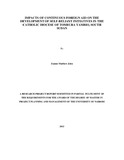| dc.description.abstract | We live in a global culture of aid in which those who have ought to give to those without
both mentally and financially. Despite Aid’s many years of existence in Africa, the Sub-
Saharan African Countries continue to be poor. The problem for which the study sought
answers was Development of Self-Reliant Initiatives (SRIs) in the Catholic Diocese of
Tombura Yambio (CDTY) is constrained due to continued reception and reliance on foreign
aid. Continuous flow of foreign aid to CDTY has created dependence on foreign-ready-made
solutions to all local church needs: stipends, remunerations, constructions, and staff. The
situation is worsened by the increasing inability of the donors to respond effectively and
adequately to the felt needs of the diocese. The purpose of this study was to determine the
impacts of continuous flow of foreign aid on the development of SRIs in CDTY. The
objectives of the study were: To determine how continuous inflows of funds from donor aid
impact on development of SRIs in CDTY; To assess the impact of expertise from foreign aid
donors on the development of SRIs in CDTY; To identify how aid conditionality by foreign
aid donors impacts development of SRIs in CDTY; To examine how responding to
emergency-oriented aid impacts on the development of SRIs in CDTY. Null hypothesis of the
study was there is no significant impact of foreign aid on the development of SRIs in CDTY.
The study employed ex-post facto and descriptive survey as the research design. A structured
questionnaire was administered to a whole target population of 61 and using census, chose a
Sample size of 61. Descriptive statistics was employed. Data therefore collected was
analyzed using statistical package for social sciences (SPSS version 17.0). The study found
out that CDTY relied on various types of funds to implement the development of Self-Reliant
Initiatives. The ratio of locally generated incomes to foreign sourced funds for development
in the diocese was very low. Thus the CDTY heavily relied on foreign sourced funds for
development initiatives in the diocese. The forms of self-reliant initiatives appropriate and
viable in CDTY context included; micro finance, micro and small enterprises (MSEs),
cooperatives and unions, village development associations and village development
committees and local community fundraising respectively. The diocese had a small number
of local staff on her projects. Therefore, the level of community participation in the CDTY
development initiatives was low and that the diocese heavily relied on expatriates in the
management of the CDTY development initiatives. The church filled skill gaps through
training, hiring local labour, hiring expatriates and through seconded staff by donor agency.
The commonly given aid conditions included; integrated financial reporting system, abide
strictly by MOU single handily made by the agency, follow supply chain of donor agency,
receipt oriented financial report, accept seconded staff and lay off some workers respectively.
The types of emergency-oriented aid that the diocese has received included; emergency food
stuff, emergency non-food items, emergency water supply, emergency shelter, emergency
health and emergency education. The study recommends that the management of CDTY
should devise home grown approaches to raise money required towards development of SRIs
in CDTY. This will help to reduce over reliance on donor fund. The CDTY management
should conduct regular capacity building functions to harness the expertise and skills of the
local staff. This will enhance their competitiveness and productivity. The CDTY management
should engage the donors to do away with aid conditionality that are prohibitive to their
development of SRIs. The CDTY management should come up with risk management
functions to assist them in better planning for emergency-oriented aid. The study suggests
further research in the same field in another country for comparison. | en |

